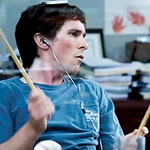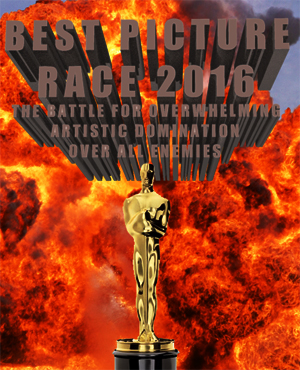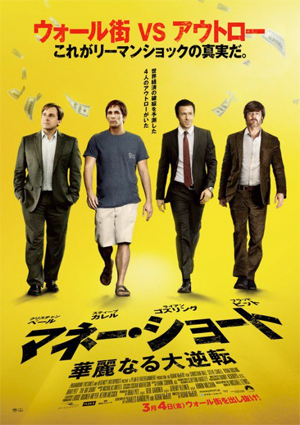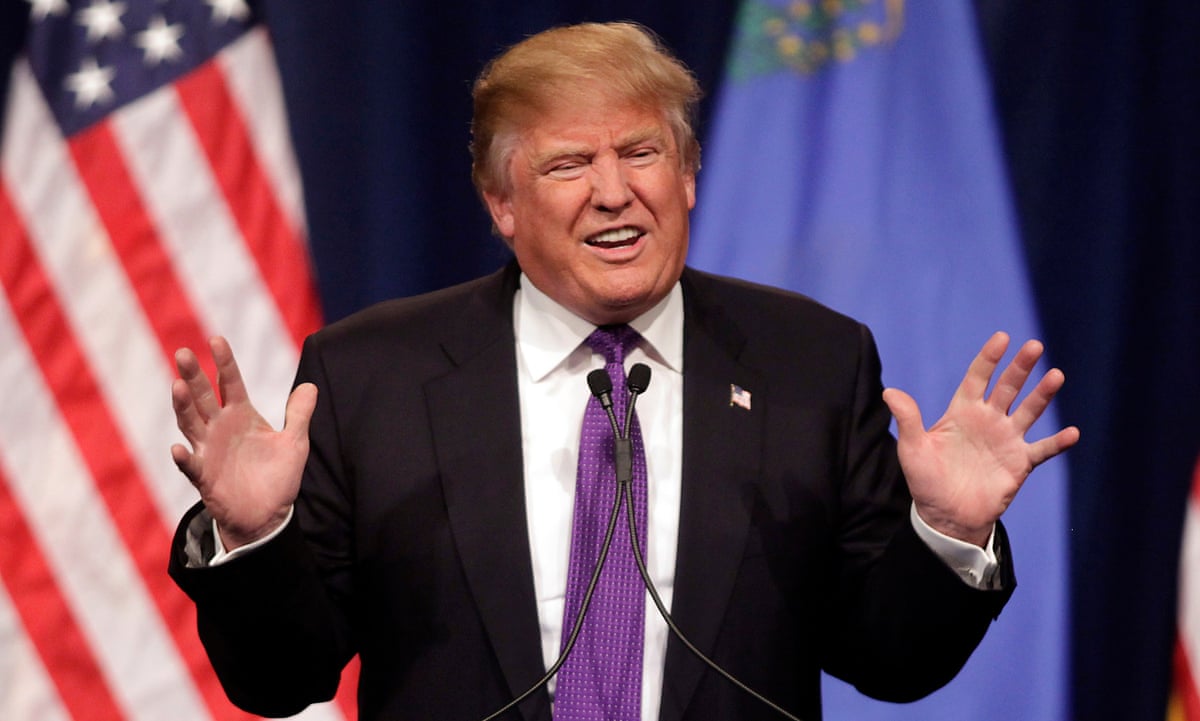
 Do you remember the Will Ferrell movie THE OTHER GUYS, how the end credits were a big animated info graphic about the banking crisis? It connected to the scheme by the villains in the movie but seemed jarringly serious at the end of a cop movie parody from the director of ANCHORMAN where Ferrell carries a wooden gun, has an evil pimp alter ego and has a chief played by Michael Keaton who quotes TLC all the time and works a second job at Bed Bath & Beyond. That’s why it’s not completely out of the blue that its director Adam McKay has made his first non-comedy, THE BIG SHORT, which has been nominated for many awards including Oscars for best picture, director and adapted screenplay. This is not the classic funny-man-yearning-for-respectability-with-corny-Oscar-bait-movie gambit. This is a rage that’s been fighting to get out.
Do you remember the Will Ferrell movie THE OTHER GUYS, how the end credits were a big animated info graphic about the banking crisis? It connected to the scheme by the villains in the movie but seemed jarringly serious at the end of a cop movie parody from the director of ANCHORMAN where Ferrell carries a wooden gun, has an evil pimp alter ego and has a chief played by Michael Keaton who quotes TLC all the time and works a second job at Bed Bath & Beyond. That’s why it’s not completely out of the blue that its director Adam McKay has made his first non-comedy, THE BIG SHORT, which has been nominated for many awards including Oscars for best picture, director and adapted screenplay. This is not the classic funny-man-yearning-for-respectability-with-corny-Oscar-bait-movie gambit. This is a rage that’s been fighting to get out.
Based on the non-fiction book The Big Short: Inside the Doomsday Machine by Moneyball author Michael Lewis, the movie tells the stories of several small-timers and outsiders in the financial world who had the foresight to see that the housing market was built on fraud and was destined to collapse. They figured out a way to basically bet against the banks, who gladly accepted the offers because they believed their own lies. They thought these people were crazy and giving them free money.
 Full disclosure: I live in an apartment. Mortgages, stocks and sub-prime loans have never been part of my experience, and hearing about them is like Greek translated into Klingon to me, except more threatening. As my woman said after the movie, “That’s the only movie I’ve ever seen that made me glad to be poor.” But McKay makes a bold attempt to translate it all for humans. Ryan Gosling, as both a character and a fourth-wall-breaking omniscient narrator, tells us it’s designed to be confusing to keep us away. He brings in absurd celebrity guests to explain some of the concepts of the “credit default swap market” in layman-friendly analogies. To be honest I’m too much of a dummy even for the dummy version, but at least I could follow enough to not give up in frustration like it’s math homework. It’s a good technique.
Full disclosure: I live in an apartment. Mortgages, stocks and sub-prime loans have never been part of my experience, and hearing about them is like Greek translated into Klingon to me, except more threatening. As my woman said after the movie, “That’s the only movie I’ve ever seen that made me glad to be poor.” But McKay makes a bold attempt to translate it all for humans. Ryan Gosling, as both a character and a fourth-wall-breaking omniscient narrator, tells us it’s designed to be confusing to keep us away. He brings in absurd celebrity guests to explain some of the concepts of the “credit default swap market” in layman-friendly analogies. To be honest I’m too much of a dummy even for the dummy version, but at least I could follow enough to not give up in frustration like it’s math homework. It’s a good technique.
If you follow McKay in interviews or social media you know he’s obsessed with politics, justice and social progress. But he’s even more into jokes. He co-created all of Ferrell’s best movies, and Funny or Die, and wrote many great Saturday Night Live sketches (Bill Brasky, Celebrity Jeopardy, the ad where Sam Waterston sells robot insurance to the elderly, the morning news show that descends into cannibalism when the teleprompter stops working). My favorite thing by him might have to be TALLADEGA NIGHTS, because it’s my most have-to-keep-watching-when-it-comes-up-on-cable comedy to date. To get an idea of his sense of humor, this is the kind of stuff he gets kids to say:
So thankfully he knew it was okay to inject his Serious Movie with a playful, anarchic spirit. It takes place between 2005 and 2008, and he reminds us of the times through impressionistic editing, flashes of media events and Youtube videos, set to song choices from Gnarls Barkley’s “Crazy” (both a period detail and a commentary on the proceedings) to John Ashcroft’s “Let the Eagle Soar.” In fact, the soundtrack is heavy on classic rock and metal, but also has Run the Jewels and The Pussycat Dolls and “Milkshake” by Kelis. At any moment it’s liable to slide into a documentary-style montage or the video for “Money Maker” by Ludacris. There are little glimpses of things that stay on just long enough to jog a memory and then disappear (including a brief shot of the then-hugely-popular Funny Or Die video where Ferrell McKay’s daughter plays a mean landlord). It makes perfect sense that editor Hank Corwin’s first film was NATURAL BORN KILLERS.
The characters are mostly weirdos, very funny performances but not too broad. Only while writing this did it occur to me that Steve Carrell is in both this and ANCHORMAN. Here he plays a rude asshole who is appropriately enraged by what’s going on and only finds out about this big short business because someone calls his office about it by mistake. He’s the most obnoxious character – at one point he interrupts a convention speaker to ask an accusatory question, then leaves to take a phone call, and Gosling turns to the camera to assure us that this really happened – but also the most moral. He’s genuinely furious about the little guy getting screwed and is trying to make things better. He may be the best person in the movie and also the one you would least want to hang out with.
Brad Pitt plays more of a quietly odd semi-retired financial guru who catches on thanks to young neighbors (John Magaro from MY SOUL TO TAKE and Finn Wittrock from NOAH and FINN IS JUST A NICKNAME, IT’S ACTUALLY PETER: THE FINN WITTROCK STORY) running a hedge fund out of a garage.
Gosling is different from all these guys. He’s a slick opportunist who hears about it and is smart enough to want in. He’s the bridge between the relatable guys and the stereotypical Wolf of Wall Street douchebags.
The Galileo of this shit, and my favorite character, is Christian Bale as Michael Burry, some kind of socially awkward (in real life he has Asberger’s) rock ‘n roll nerd who listens to loud music and plays with drumsticks at his desk while his brain figures out things nobody else has.
At first I thought Bale was doing some kind of cross-eyed thing, but the character turns out to have a glass eye, so I’m sure it’s a contact. But I wouldn’t put it past him to just act his eye into glass. He wears the most true-to-life ugly shirts ever on film. Not wacky loud shirts, just boring shirts for surf shops or guitars, washed way too many times, exactly the type of shirts that sit for years on Value Village racks because they have no kitsch or retro value, they weren’t even cool at the time and now they’re faded and gross.
Bale gets to be emotional and actorly, but also funny. Somehow he’s able to rise to the top of a great ensemble cast even though I’m pretty sure he spends the entire movie inside his office, with the exception of one cathartic scene where he pounds out a raging drum solo in his basement.
There’s kind of an air of these guys being the brilliant mavericks who cleverly gamed the system, a cross between an underdog biopic and a heist movie. It makes you feel a little uncomfortable because it makes them very likable, but they’re not trying to figure out how to warn people or save the day. They’re just exploiting the situation for their own profit. To their credit they start to feel ashamed as it becomes real and they’re benefiting from other peoples’ tragedy. Instead of applauding their cleverness the movie asks why the hell else nobody noticed. The answer, I think, is in the this-is-just-how-things-are attitude of the bankers and regulators they meet with as they’re researching the whole thing. Some are bros, bragging about ripping people off, the way a bad soldier might brag about some shitty thing he did to the locals. They can’t see beyond the status quo. This is how they were taught to do it. It doesn’t occur to them that it’s unsustainable.
I’m kinda surprised how good this movie is. It’s full of righteous anger, illuminating a crime we already know about, but helping us to understand it better, and reminding the country that the perpetrators still haven’t been punished and the system still hasn’t been fixed. But it’s also fun. It has a bunch of great characters and performances, good actors seeming to have a good time, many of them getting to play against type.
We’ll see on Sunday, but right now it even seems to have a shot at best picture, because it won the PGA award, it’s about an Important Topic and it’s very actor friendly. Obviously FURY ROAD is the actual best picture, but in a flawed and corrupt world blind to true beauty I’d be more okay with this winning than some of the other ones.
Here are the two things I hope come out of the popularity of this movie:
1. New regulations to prevent this sort of thing from happening again
2. Christian Bale becoming a regular in Will Ferrell movies




























February 22nd, 2016 at 12:30 pm
Ooooh, this sounds like more my kinda thing.
*Checks multiplexes nearby*
FUUUUUUUuuuuuuu…